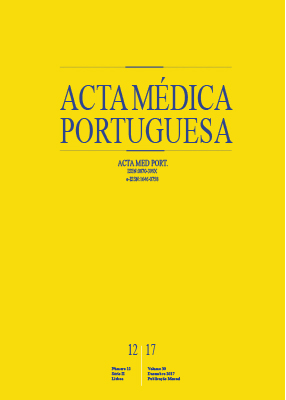Effects of Speech Therapy in Hospitalized Patients with Post-Stroke Dysphagia: A Systematic Review of Observational Studies
DOI:
https://doi.org/10.20344/amp.9183Keywords:
Deglutition Disorders, Hearing Disorders, Hospitalization, Language Therapy, Review, Speech Therapy, Stroke/complicationsAbstract
Introduction: Since dysphagia may be one of the brain post-stroke consequences, the objective of this study was to analyze the average recovery time of patients with cerebrovascular accident and dysphagia subjected to speech therapy in a hospital bed.
Material and Methods: Systematic review performed following the ‘Preferred Reporting Items is Systematic Reviews and MetaAnalyses’ instructions. The search was performed in different electronic databases, without restriction of time and language. The studies were evaluated regarding their methodological quality.
Results: Of 5671 titles, five studies were included. 176 patients with stroke and dysphagia were obtained (aged between 22 and 91 years old – average: 68.95), with no preference regarding gender. Improvement occurred in 84.26% of the subjects and the recovery time was between one and ninety days (average: 22 days). Randomization, blinding, loss to follow-up and withdrawal were not performed with control group in any study.
Discussion: The success of rehabilitation of oropharyngeal dysphagia as a post-stroke sequela will depend on the extent, location of the neurological lesion and early intervention in the hospital bed. Despite the recognition of health professionals about the importance of swallowing rehabilitation for these patients, there is a lack of studies that support an evidence-based practice, although the results point to improvements in this regard.
Conclusion: Speech therapy in hospital bed in post-stroke hospitalized patients with dysphagia seems to bring satisfactory results in the short-term, revealing the importance of diagnosis and early intervention in these cases.
Downloads
Downloads
Published
How to Cite
Issue
Section
License
All the articles published in the AMP are open access and comply with the requirements of funding agencies or academic institutions. The AMP is governed by the terms of the Creative Commons ‘Attribution – Non-Commercial Use - (CC-BY-NC)’ license, regarding the use by third parties.
It is the author’s responsibility to obtain approval for the reproduction of figures, tables, etc. from other publications.
Upon acceptance of an article for publication, the authors will be asked to complete the ICMJE “Copyright Liability and Copyright Sharing Statement “(http://www.actamedicaportuguesa.com/info/AMP-NormasPublicacao.pdf) and the “Declaration of Potential Conflicts of Interest” (http:// www.icmje.org/conflicts-of-interest). An e-mail will be sent to the corresponding author to acknowledge receipt of the manuscript.
After publication, the authors are authorised to make their articles available in repositories of their institutions of origin, as long as they always mention where they were published and according to the Creative Commons license.









